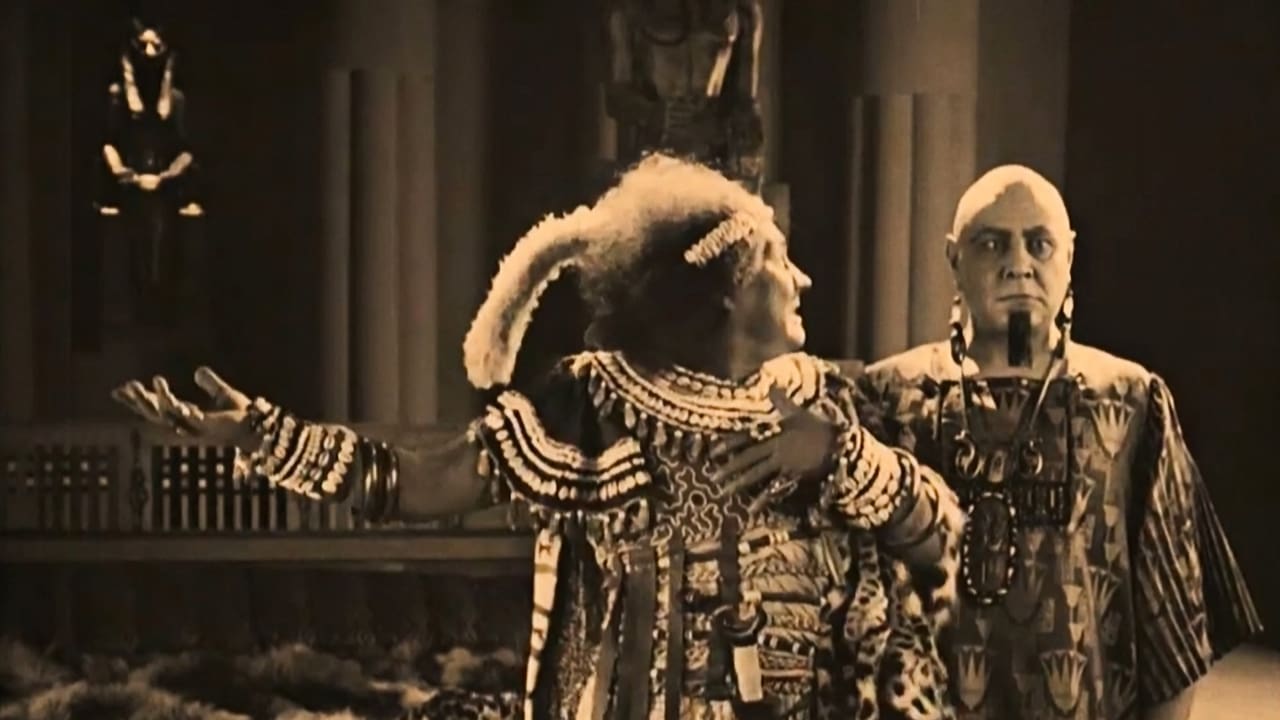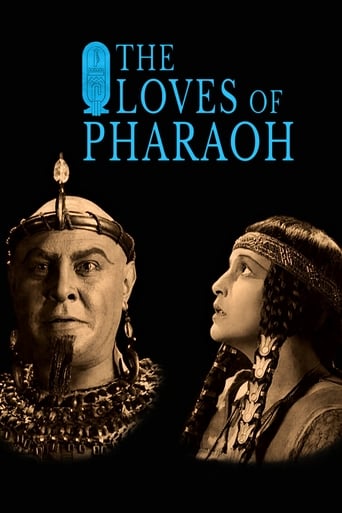

"Das Weib des Pharao" or "The Loves of Pharaoh" is a German movie from 1922, so this one will soon have its 100th anniversary already, only slightly over five years to go. The director is early German filmmaking legend Ernst Lubitsch and he was around the age of 30 when he made this one, long before his Hollywood success. The writers are Norbert Falk and Lubitsch's longtime collaborator Hanns Kräly (later an Oscar winner even, something Lubitsch himself never achieved). But back to this one here. Given the year, it should not be a surprise to anybody that this 100-minute movie is a black-and-white silent film. And as with some other early films from Germany, it takes us into a world and culture that is fairly different compared to ours, especially compared to the fairly bleak years between World War I and the Nazis' rise to power here in Germany.Egypt is the center of the action here and like with many other early silent films, it is a mix of drama, costumes and romance as well. Horror is non-existent in here and neither is comedy. The cast includes a handful of fairly successful silent film actors from back then, not just Emil Jannings, but also Harry Liedtke and Paul Wegener for example and if you have an interest in German movies from that time, then you will see more than just one or two familiar faces. I myself have never been that big really on these very old silent films and sadly this one here cannot change my perception. As many other times, I also felt that it lacks intertitles on many occasions, so that the actual story is fairly difficult to follow at times and the plot not too easy to understand. Still, if you like the genre more than I do and maybe even care about films set in ancient Egypt, then this can be a pretty rewarding watch for your and I would not totally say that I don't recommend it to anybody. However, if this description does not fit you, then maybe it is best to stay away or check out comes other silent films from the 1920s first (more known ones like "Metropolis" or other Fritz Lang works) before deciding to give this one a go. I give it a thumbs-down.
... View MoreThe Loves of Pharaoh (1922) *** (out of 4)Imressive German epic from Ernst Lubitsch about the war that breaks out when an Ethiopian King (Paul Wegener) offers his daughter to a Pharaoh (Emil Jannings) but she then falls his love with one of his servants. THE LOVES OF PHARAOH is a very impressive silent thanks in large part to the wonderful visuals and mammoth sets, which certainly make this rank right up there with the work that D.W. Griffith and Cecil B. DeMille were doing around this same time. I think the most impressive thing is how massive the sets are and how many extras were used during the battle sequences. There are some moments here that make you want to pause the film just so you can get a better look of everything that's going on. The greatest sequence comes towards the end of the picture when we see a giant hill where the camera is pointing straight at it. The action then starts and you see hundreds of people at the bottom of the hill fighting with hundreds more coming from over the hill, down in and into the battle. These scenes are just so big that you can't help but wonder how long it must have taken just to get one shot. The performances are another major plus with Jannings doing an excellent job with the villain. I thought he was extremely believable in the part and he never goes overboard with his madness. I also really enjoyed seeing Wegener here as the "look" from THE GOLEM is still here. Lubitsch does a masterful job at building up all the action but I think the film's one flaw is the screenplay. I never really cared about any of the characters and I found the story to be a tad bit too dull for its own good. Several portions of the film are still missing so photos are put in the missing segments place.
... View MoreThe fabulous restoration of this film alone makes it worth viewing. The pictures are glossy and luscious as to be almost magical. It makes you realize that even though the movies were still silent in the 1920's, the quality of the film was first rate.Also extremely noteworthy of the version recently shown on TCM is the spectacular orchestral score, really one of the best. Try to actively listen to the music if you can from time to time - especially in the late battle scenes, it is worthy of Wagner.The sets are over the top, and the cast begins as a cast of dozens, then scores, then hundreds, and then literally thousands as the climactic battle scenes are reached. The Germans really outdid themselves here, easily matching the Hollywood spectacles of the same era. With great skill, director Ernst Lubitcsh was able to interweave outlandish spectacle with a lot of close-up tragedy, perhaps having learned this technique from watching D.W. Griffith fliks.Unfortunately, the exaggerated emotive acting is a little painful to watch at times. This is the kind of over-acting histrionics that would be mocked by some for many years after the advent of sound.The plot occasionally borders a bit on the unbelievable as well. I think the silliest thing was when, early in the film, the pharaoh is about to sign a peace treaty with the Ethiopians, when suddenly he is informed that someone is "approaching" the Treasury! In great shock, the king abandons the ceremony to deal with this incredible event personally! This would be like President Roosevelt walking out on the Yalta Conference in order to deal with a dog that had piddled in Lafayette Park across the street from the White House. Silly indeed.The actor playing the hero "Ramphes" may also have the ugliest haircut in the history of serious film.But these are minor distractions. "The Loves of Pharaoh" is art, and it is movie history, and the glorious restoration makes it well worth viewing.
... View More"Das Weib Des Pharao" (1922) has been one of the most anticipated silent film restorations released in this modernen year. September saw the long awaited premiere of the film which was superbly restored thanks to the efforts of different European institutions. This little known Herr Ernst Lubitsch movie of his German period is now available to the joy of silent film fans around the world. "Das Weib Des Pharao" was the last film directed by Herr Lubitsch before he departed to Amerika where his career was very different in terms of artistic style and goals. Certainly "Das Weib Des Pharao" is characteristic of his work during his Teutonic epoch.First of all, the film is "kolossal": magnificent décors, lavish and gorgeous costumes, crowd scenes astonishing in the number of extras employed. This huge production and Herr Lubitsch's mastery transports the audience back to ancient Egypt.But "Das Weib Des Pharao", spectacular art direction and staging notwithstanding, is also a tormented love story, intimate and nuanced and combining seamlessly with the more spectacular dimension of the plot, the war between the king of Ethiopia Herr Samlak ( Herr Paul Wegener ) and the pharaoh Herr Amenes ( Herr Emil Jannings ). The conflict begins when the king of Ethiopia invades Egypt because his daughter, Frau Makeda ( Frau Lyda Salmonova ) has been rejected by Herr Amenes due to his infatuation with Frau Theonis (Frau Dagny Servaies), namely slave of Frau Makeda. To complicate matters, Theonis is in love with Herr Ramphis (Herr Harry Liedtke). Theonis, against her will, becomes the Queen of Egypt. Tragedy follows for all.This Herr Von was absolutely fascinated during the scenes between the pharaoh Amenes and the beautiful slave Theonis; Jannings' restrained performance shows all the pain and longing of unrequited love as he vainly tries to win her favour. Some of the scenes are in lovely chiaroscuro; the cinematography by Herr Alfred Hansen und Herr Theodor Sparkhul is brilliant."Das Weib Des Pharao" is for this German count a very special Lubistch oeuvre, combining the characteristics of a "kolossal" picture with intimate melodrama. None of the Lubitsch wit is on hand and there is certainly no humor in the film to lighten the story. It remains serious all the way through and is without concessions, making it a very unique Lubitsch film whose rediscovery is a great gift to lovers of the Silent Era. And now, if you'll allow me, I must temporarily take my leave because this German Count has an appointment with his beautiful Teutonic slave instead of one of his fat German heiresses.
... View More